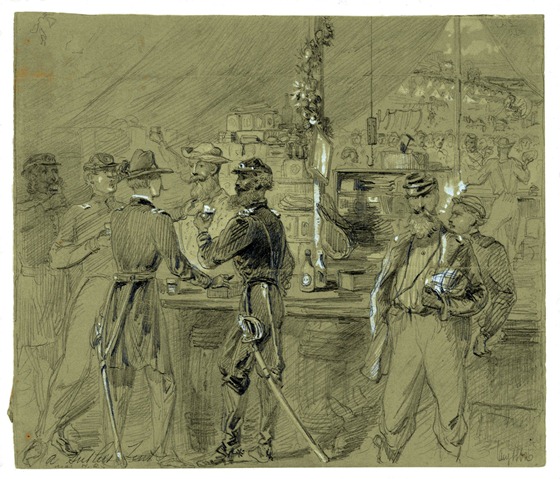
Library of Congress image.
Detailed sketch of the interior of a sutler’s tent, with several full-length portraits of unidentified officers drinking at a bar in the foreground, drawn in August 1862, byArthur Lumley.

Library of Congress image.
Detailed sketch of the interior of a sutler’s tent, with several full-length portraits of unidentified officers drinking at a bar in the foreground, drawn in August 1862, byArthur Lumley.
AUGUST 19TH.—Day and night our troops are marching; they are now beyond the right wing of Pope, and will soon be accumulated there in such numbers as to defy the combined forces of Pope, Burnside, and McClellan!

August 19th. By 7 A. M. we were in, line, tents struck, wagons loaded, and commenced the march in first-class condition. The country improves the further we go, and to-day’s eight miles march was through a paradise, compared to the region of Manassas and the Chickahominy. Went into bivouac early in the afternoon and remained all night. There are plenty of excellent springs about this country, in addition to numerous other good things, and the campaigning reminds me all the time of Charles O’Malley’s experience in the Spanish peninsula.
August 19.—The steamer Swallow was burned by the rebels, at a point on the Mississippi River, twenty-five miles below Memphis, Tenn.—A skirmish took place near Rienzi, Miss.
— The following order was issued from the War Department at Washington:
The Department of the Ohio, hereby created, will be composed of the States of Ohio, Michigan, Indiana, Illinois, Missouri, and Kentucky, East of the Tennessee River, and including Cumberland Gap, and the troops operating in its vicinity. Major-General H. G. Wright is assigned to the command of the Department of Ohio.
— A large and enthusiastic war meeting was held in Brooklyn, N. Y. A series of patriotic resolutions were adopted, and speeches made by Generals Crooke, Walbridge, Sickles and Spinola, Admiral Paulding, Rev. Dr. Cox, and others.
—A force of Union cavalry from New-Madrid, Mo., under the command of Captain Frank Moore, while on an expedition to Charleston, attacked a rebel camp on White Oak Ridge, near Hickman, killing four and taking nineteen of the rebels prisoners, including three captains. They also captured twenty-seven horses and about one hundred stand of arms. Captain Moore and one private were wounded.
— The Board of Supervisors of Rensselaer County, N. Y., assembled at Troy, appropriated seventy-five thousand dollars as bounty money, to be paid to volunteers enlisting into the army under the call of the President.
— The Sioux Indians destroyed the United States Agencies at Yellow Medicine and Red Wood, and partially destroyed New-Ulm, Minn., killing and brutally mutilating more than a hundred persons, men, women, and children.